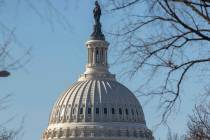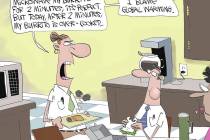Sharing diapers
The parade of bogus budget-cutting choices has begun.
All week, the appendages of state government have been presenting their suggested spending reductions to finance-fatigued lawmakers. As usual, their recommendations are designed to elicit gasps of horror from politicians, heap guilt on struggling taxpayers and hurt the state's most vulnerable residents as much as possible.
On Tuesday, Mike Willden, director of Health and Human Services, offered a doozy of a cut: rationing diapers for the disabled and elderly incontinent. The state would save $829,304 making these people sit in their own waste a little longer -- and cover one-tenth of 1 percent of Nevada's estimated $881 million revenue shortfall.
"It is abhorrent to be discussing this," Assembly Speaker Barbara Buckley, D-Las Vegas, said of the diaper cuts -- never mind that the reduction would still give incontinent adults six diapers per day, which is an accepted national standard.
The recession has had brutal consequences for hundreds of thousands of Nevadans. The unemployment rate sits at 13 percent. Businesses are going bankrupt and closing. This week, the five-diamond Ritz-Carlton Lake Las Vegas resort announced it would cease operations May 2.
But the political theater playing out in Las Vegas and Carson City is focused exclusively on extremes and playing to emotions. We're still waiting for lawmakers to hold a hearing that examines the state's growth in personnel costs, including retirement benefits, or the fact that many state workers have responded to mandated furloughs by ratcheting up their overtime.
Did you know that most state workers got pay raises of between 8 and 9 percent in the summer of 2008, and raises of between 3 and 4 percent last year?
Lawmakers are considering sacrificing services to the poor and sick, but where is the sacrifice on the part of the state itself?























